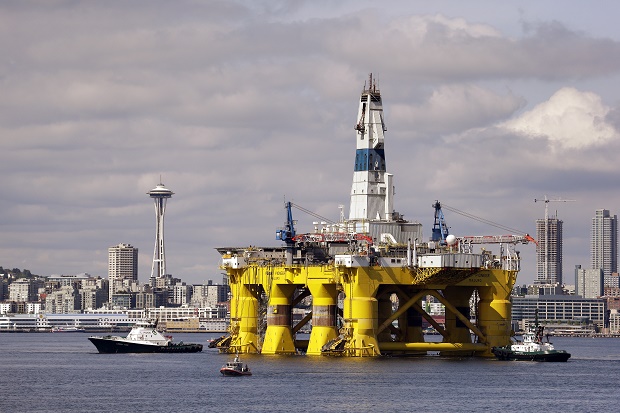Melting Arctic attracting renewed military attention

In this May 14, 2015, file photo, the Royal Dutch Shell oil drilling rig Polar Pioneer is towed toward a dock in Elliott Bay in Seattle. Three weeks after Royal Dutch Shell announced it was walking away from exploratory drilling in U.S. Arctic waters, the Obama administration has taken steps to keep drill rigs out of Alaska’s northern ocean for a decade or more. Interior Secretary Sally Jewell announced Friday, Oct. 16, 2015, the federal government is canceling federal petroleum lease sales in U.S. Arctic waters that were scheduled for 2016 and 2017. AP File Photo
FAIRBANKS—In 2013, US President Barack Obama said the Arctic was “peaceful, stable and free of conflict” as he laid out a national strategy for the region.
But just two years later, the rapid retreat of ocean ice cover, a newly emboldened Russia and the covetous gaze of nations keen to exploit new shipping lanes and vast mineral wealth are putting the Arctic’s longstanding stability under pressure.
“The Arctic is a region that is getting more and more important,” US Defense Secretary Ashton Carter said on Friday as he visited troops at Fort Wainwright in the Alaskan city of Fairbanks, about 200 miles (320 kilometers) south of the Arctic Circle.
“It’ll be important to the United States, it’ll be important to other countries. It’ll be important that we keep the peace and a rules-based kind of order,” he said.
Alaska and the Arctic are of key strategic importance for the United States.
Article continues after this advertisementMissile defense systems are here and planes can overfly the North Pole to quickly reach destinations across the Northern Hemisphere.
Article continues after this advertisementBut budget constraints mean the Pentagon is weighing plans to slash the presence of some 2,600 specialized cold-weather troops at a base in Anchorage.
Russia launched elaborate Arctic war games this summer involving thousands of troops as it tries to bolster claims to the region’s vast hydrocarbon and mineral wealth.
And when Obama visited Alaska the following month, five Chinese naval vessels were spotted in the Bering Sea between Russia and Alaska. It was believed to be the first time Chinese military ships were seen in the area.
Critics of the Obama administration say the United States is failing to grasp an urgent need to boost US military might in the Arctic region.
“Am I predicting a Russian invasion of Alaska next week? No. But does it make sense to be withdrawing our well-trained Arctic warriors in the face of this? Strategically it doesn’t make any sense,” Republican Sen. Dan Sullivan of Alaska told Agence France-Presse.
New ‘cold’ war?
A 2013 Pentagon strategy document for the Arctic warned against promoting a high profile for the US military in the region, saying it could trigger escalating rivalries with other armies.
“There is some risk that the perception that the Arctic is being militarized may lead to an ‘arms race’ mentality,” it said.
After Vladimir Putin began his third term as Russian president in 2012, he started trying to boost his country’s dominance in its Arctic region.
Sullivan this week read out a list of alarming statistics to the Senate Armed Services Committee about Russia’s military commitment.
He said a new Russian Arctic command will include four new Arctic brigades, 50 airfields by 2020, increased long-range air patrols by Russian bombers and a total of 40 conventional and nuclear icebreakers, with 11 more planned.
Many of the bases will be refurbished Cold War facilities that had fallen into disrepair after the collapse of the Soviet Union.
By contrast, the United States only has two icebreakers and one of them is broken, Sullivan said. He suggested America needs at least four more.
“It’s a joke,” he said of the Pentagon’s current Arctic plans. “It’s not a serious military strategy document.”
More than 20 percent of the world’s hydrocarbon reserves yet to be discovered are situated in the Arctic, the US Geological Survey has said.
Emphasis on Asia-Pacific
Carter’s visit to Alaska is his first stop on an eight-day trip primarily focused on the Asia-Pacific region.
He will meet with leaders from more than a dozen nations across East and South Asia. Officially, his mission is to help push the next phase of America’s “rebalance” to the vitally important region.
But a central theme of the trip is likely to be China’s continued construction of artificial islands in the South China Sea and claims of sovereignty.
Last week, the US military sent a destroyer within a 12-mile zone of one group of islets claimed by China in a move that infuriated Beijing.
Carter will attend a US-South Korea security meeting in Seoul and the Association of Southeast Asian Nations defense ministers meeting in Kuala Lumpur, Malaysia. AFP